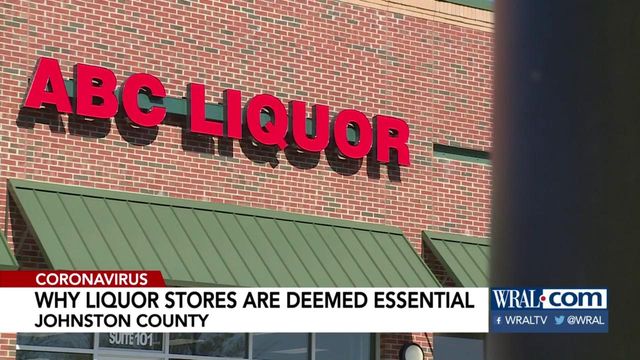Two Johnston County ABC store workers tested for COVID-19
State-run ABC stores are considered "essential" businesses under the state's shut-down order. But the potential risk to workers has some questioning that classification, especially after two Johnston County ABC workers were sent home for testing.
Posted — UpdatedTwo Johnston County ABC store employees are self-isolating Thursday after being tested recently for coronavirus.
Swade Carroll is general manager for the Johnston County ABC Board. He declined our request for an interview, but told us he ordered the two employees to stay home and get tested as a precaution two weeks ago, after they mentioned possible exposure to COVID-19.
Both employees work at the ABC store at McGee's Crossroads.
Carroll said both have been tested. One test was more than a week ago, but he said results have not come back yet.
In the meantime, Carroll said he decided not to shut down the store, noting that one worker showed no symptoms at all. He said he didn’t think it was necessary to lose two or more weeks of sales, but said if both workers test positive, he will close the store.
Johnston County ABC employees who contacted WRAL News about the issue said other employees were not notified. They say they're concerned about the safety of co-workers and customers.
State-run ABC stores are considered "essential" businesses under the state's shut-down order. Almost every other state with a stay-at-home order has also exempted liquor stores from closure.
The lone exception is Pennsylvania, where Gov. Tom Wolf is facing pressure to reopen stores after shuttering them March 17th. The state opened an online liquor store Apr. 1, but high demand is crippling the site.
In Pennsylvania and here in the Triangle, substance abuse experts say abruptly shutting down access to alcohol could be dangerous to people who are physically dependent on it.
John Watkins owns Johnston Counseling Services, which provides treatment for alcohol addictions.
"Some of your most serious cases can be deadly. However, that's a small percentage," Watkins explained. However, others can go into some form of withdrawal in about 12 to 14 hours.
With health officials warning about hospital bed shortages, that could burden an already overstretched health system.
Then again, Watkins says, keeping liquor stores open could also be a dangerous temptation for people stressed out by the crisis.
Related Topics
• Credits
Copyright 2024 by Capitol Broadcasting Company. All rights reserved. This material may not be published, broadcast, rewritten or redistributed.





